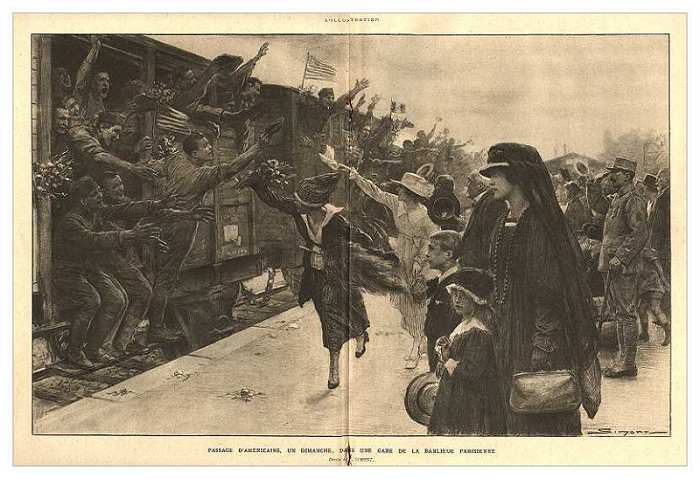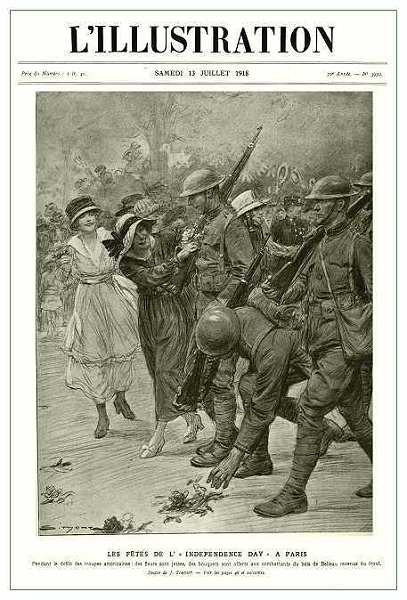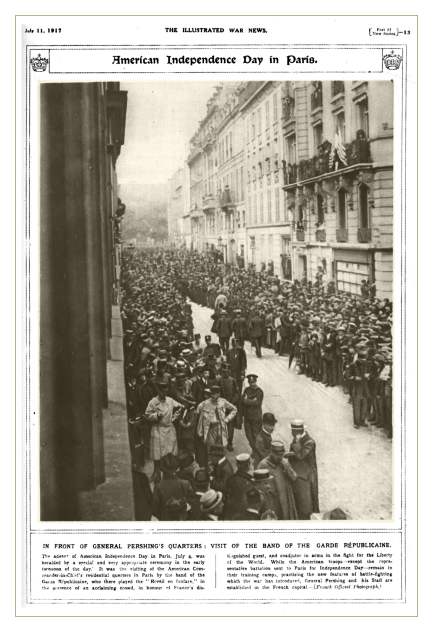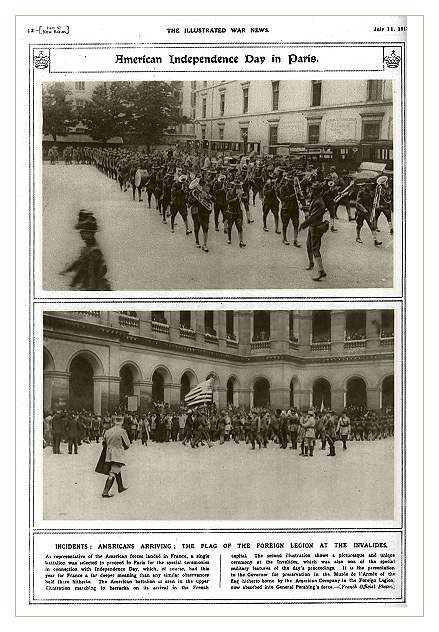

Stories of American Troops on Road to the Front

- from the French magazine 'l'Illustration'
- 'Arrival of American Troops in a Paris Suburb' - an illustration by J. Simont
It was one of the most dramatic scenes in the world's history when on that twenty-seventh day of June, 1917, the first American Army that ever crossed the seas to Europe stepped foot on the soil of France to join its allies in the war to "make he world safe for democracy." America at last was repaying the debt which it owed France when she crossed the Atlantic to fight with Washington's Army in the American Revolution. The historic scenes are described by Lincoln Eyre, who was attached to the Joffre commission on its tour of triumph in the United States. He is now with the American Army as war correspondent for the New York World.
I - STORY OF THE ARRIVAL OF GENERAL PERSHING ON FRENCH SOIL
Boulogne, France, June 13, 1917
from 'Leslie's Magazine'
CHEERING thousands, moved to tears, welcomed General John J. Pershing on his arrival here to-day. The tall, soldierly-appearing figure of Pershing, garbed in the business-like khaki of the American army, was acclaimed as France has seldom acclaimed another in all her history. Frenzied crowds packed the streets to shout their joy and wave the Tricolor of France with the same three colors of the Star-Spangled Banner. General Pershing was welcomed at the dock by Gen. Pelletier, representing the French Government and General Headquarters; Commandant Hue, representing the Minister of War; Gen. Lucas, commanding the northern region; Col. Daru, Governor of Lille; the Prefect of the Somme and other public officials.
Pershing arrived at 9:40 o'clock this morning. He was deeply moved by the greeting he received. 'I consider this one of the most important moments in American history," he said. "Our arrival on French soil, constituting as we do the advance guard of an American army, makes us realize to the fullest the importance of America's participation. Our reception has moved us deeply. I can only reaffirm that America has entered the war with the intention of performing her full share - however great or small the future will dictate. Our Allies can depend upon that absolutely."
A small French boy who edged forward in the crowds that greeted the American general was noticed by Pershing. He wanted something and Pershing wanted to know what it was. He came forward and shyly shook hands with the big, smiling American and then asked him to sign an autograph album, proudly displaying the signatures which he had already obtained in it from Marshal Joffre and Field Marshal Haig. Gen. Pershing stopped right there and signed the book.
While Pershing and the commissioned officers of his staff disembarked and were immediately taken away in automobiles, non-commissioned officers and privates-orderlies and attaché to the American General's entourage - swarmed off the vessel and mixed joyously with the crowd at the railway station. There were British Tommies there to welcome their new brothers in arms-and French poilus as well. Hundreds of handshakings - and embraces - marked the meeting of these representatives of three great armies, now pledged to a common purpose.
Boulogne harbor was alive early in the morning awaiting the arrival of the American General and his staff. The first notice that the ship was finally arriving came with the roar of salutes from French patrol boats in the outer harbor. Then the British troopships hastily shifted their anchorage to allow the boat with its all-important cargo to dock at the principal wharf. There a huge American flag was flung to the breeze from the topmost part of the landing stage, while on the dock itself a brilliant, colorful assembly awaited, cheering so that their welcome must have been heard far out over the waters as the boat slowly nosed her way between the whistle-shrieking and gun-barking craft in between.
On the dock were British, French and Belgian officers, formally drawn up in rigid salute as Gen. Pershing first put his foot on French soil and gave evidence in the flesh of America's determination to fight. René Besnard, Under Secretary of War, was the Governmental representative at this notable scene. He arrived from Paris and shook hands with the American commander as he stepped ashore. French Government officials formally welcomed Gen. Pershing and his staff in the name of the nation and the Americans were taken to a special train en route for Paris.
II - SCENES WHEN PERSHING ARRIVED IN PARIS
Paris, June 13, 1917
Paris, frantic with enthusiasm, streets massed with throngs waving the American and French flags, greeted Major-Gen. John J. Pershing and his staff here at 6:30 o'clock this evening. Marshal Joffre, former Premier Viviani, Minister of War Painlevé, American Ambassador Sharp and a score of other dignitaries greeted the American commander and his officers at the Gare du Nord.
"The living symbol of America's help in the war for civilisation.”
"The man who will lead the American armies!"
Such were the tumultuous salutes.
Hundreds of thousands thronged the sidewalks from the railway station, the Gare du Nord, to the Hotel CrilIon, where Gen. Pershing made his headquarters. From the moment the automobile, in which he rode with Minister of War Painlevé and Gen. Peltier, designated as his honorary aide, moved slowly into the boulevard outside the railway station, until he arrived at his hotel, the cheering was continuous and, if possible, increased in volume, and the crowds fairly smothered the Americans with flowers.
As Gen. Pershing stepped on the railway platform he found awaiting him M. Viviani, Minister Painlevé, Marshal Joffre, Gen. Foch, Gen. Dubail, Military Governor of Paris; M. Mithouard, President of the Municipal Council of Paris, and American Ambassador Sharp. M. Mithouard spoke a few words of welcome. A company of infantry was lined up as a guard of honor, and the Republican Guard Band played "The Star Spangled Banner." Gen. Pershing shook hands in the most cordial fashion with M. Viviani and Marshal Joffre and remarked, with a smile: "It does not seem long since we saw you in Washington."
Then he was escorted to the Painlevé automobile. Ahead of it was that occupied by M. Viviani and Ambassador Sharp, and behind one bearing Marshal Joffre and Rene Besnard who had accompanied Gen. Pershing.
From windows the Stars and Stripes were waved by men, women and children. French girls, with flowers bought from their savings, fought for a chance to hurt their offerings into the laps of the astonished Americans. The ride to the Hotel Crillon, in which suites for the General and his chief officers had been reserved, lay through many of the principal streets, and the motors were driven slowly to afford the crowds a good look at the Americans.
Paris, June 14, 1917

- from 'Leslie's Magazine' -
- right - General Pershing at Layfayette's tomb
This was Pershing Day in Paris. The cheers which greeted the American general's entry into the city yesterday were re-echoed wherever he appeared to-day. All gloom which has pervaded the city for months seemed to dissipate wherever the tall figure of the American appeared.
When the General appeared on the Place de la Concorde this morning he was wildly cheered by thousands who lined the streets. He was escorted to the Palace of the Elysée with military honors and was presented to President Poincare, after which he was entertained at breakfast. Other guests were Premier Ribot, Gen. Painlevé, Marshal Joffre, Minister Viviani, Ambassador Sharp and many prominent statesmen.
In the afternoon he was escorted to the Chamber of Deputies by Ambassador Sharp. The unexpected appearance of Gen. Pershing in the diplomatic gallery turned a commonplace meeting of the Deputies into a great ovation for the American General.
Premier Ribot, who had been discussing the Greek situation, recognized Gen. Pershing and switched from his speech, saying: "We are confronted afresh by beholding the United States coming to the rendezvous of the representatives of a free people."
As the Deputies leaped to their feet in honor of the American General, the Premier continued: "The people of Paris are so sure of themselves that in their acclamation of Gen. Pershing they are writing the first chapter in the history of the constitution of a society of nations."
The Chamber turned with one accord to where Gen. Pershing stood. He bowed his acknowledgments of the Parliamentary greeting. Following Premier Ribot, Foreign Minister Viviani said that "neither pen nor note could do justice to the reception which he and Gen. Joffre were accorded in the United States."
M. Viviani referred to President Wilson as "that great, calm figure in whose untrembling hands there rests, with Washington and Lincoln, all the grandeur of American history."
A tremendous outburst of applause filled the auditorium when M. Viviani told of how at Chicago, once the center of pro-Germanism, he had been promised that the last American and the last American dollar would be given by the United States that France might restore Alsace-Lorraine.
This morning Gen. Pershing stood with uncovered head at the tomb of Napoleon and paid tribute to one of the world's greatest commanders. With his staff he was received at the Hotel des Invalides by Gen. Niox, the commander, and Gen. Malterre. As the American party entered the spacious grounds leading to the building they encountered a number of veterans. A grizzled soldier of the Crimea saluted. Gen. Pershing stopped and extended his hand, saying: "It is a great honor for a young soldier like myself to press the hand of an old soldier like yourself who has seen such glorious service."
Gen. Niox conducted the American commander within the vast rotunda, with its walls hung with battle flags, and thence the party proceeded below to the crypt where the sarcophagus of Napoleon reposes. Entrance to the crypt is rigorously limited, and it is seldom that any one is admitted except crowned heads or a former ruler, as in the case of ex-President Roosevelt when he visited Paris. .
Gen. Pershing was then conducted to the Artillery Museum, where precious relics of Napoleon are preserved. He was particularly interested in Napoleon's sword and Grand Cross of the Legion of Honour. An hour was spent in the building.
To-night Gen. Painleve gave a dinner in honor of Gen. Pershing. Among the guests were famous French soldiers, Allied diplomats, residents in Paris, and French statesmen.
III - STORY OF ARRIVAL OF FIRST AMERICAN TROOPS IN FRANCE
Paris, July 1, 1917
from 'Leslie's Magazine'
Paris was overwhelmed with joy this morning at the first published announcements that all of the first contingent of United States troops had landed safely in France. It was not long, either, until the city got a sight of American sailors, marines and even a few regulars - soldiers assigned to duty with various officers who have come immediately to Paris from the port of landing.
Already the French are stirred to exultation and a realization of the victory which they feel sure to come now that America has its fighting men so near the front: The fraternization of the Americans with the English, Canadians, Australians and French is remarkable, and the new arrivals are being received everywhere with open arms and open hearts. Last month nearly all the British troops not having near relatives in the British Isles have been coming to Paris on leave, and so the newly landed Americans find plenty of comrades able to speak their common language.
The Yankees warmed up particularly to the Canadians, among whom are many Americans, but the greatest surprise came at the way the French officers and poilus fraternize with their new allies. The appearance of American naval officers in white duck summer uniforms in the smart Paris restaurants causes gasps of astonished delight.
The French press has extended an enthusiastic greeting to the American troops. The Temps dwells upon their youth, vigor, and military aspect, and the completeness of their equipment.
The Journal des Debats says: "The grand democracy of the New World does nothing by halves. It entered this vast conflict in full consciousness of the ends to be attained and with full resolution to neglect nothing in attaining those ends. What we witness to-day in the arrival of the Americans on French soil is magnificent proof .of this fact. Two months and a half after the Americans entered the war their hardy troops arrive in solid lines upon the European front, and it is not a modest advance guard. On the contrary, the forces which have just landed on our shore surpass anything which could reasonably have been expected within so short a time. When we recall the length of time it took England to move her forces to South Africa, and, similarly, the length of time it. took us to move our troops to Salonica this remarkable accomplishment by the Americans is seen in its full significance. The material they bring is on the same abundant scale as their troops. hose who have been doubtful whether the American concourse would come in time have failed to estimate at its just value the tremendous moral and material American power that German brutality has mobilized against itself. And what we see to-day is only the commencement. Each day henceforth will increase the weight of that formidable sword thrown into the balance by the great Republic of America. Who can, even in Germany, be blind to the inevitable consequences of the events we are now witnessing?"
IV - AMERICAN SOLDIERS CELEBRATE FOURTH OF JULY IN PARIS
Paris, July 4, 1917

4th of July parade in Paris 1918 as portrayed by two French newsmagazines 'l'Illustration' and 'le Miroir'
All France celebrated the Fourth of July. Paris turned out a crowd that no American city ever surpassed for size, enthusiasm and profusion of Stars and Stripes. A battalion of the first American expeditionary force about to leave for training behind the battle front had its first official review in France and was the centre of the celebration. Everywhere the American flag was flying from public buildings, hotels and residences and from automobiles, cabs and carts, horses' bridles-even the lapels of pedestrians' coats displayed it.
The crowds began early to gather at vantage points. Rue de Varenne was choked long before 8 o'clock this morning, when the Republican Guards Band carried out a field reveille under Gen. Pershing's windows. All routes toward the Hotel des Invalides were thronged even before Pershing's men turned out. About the Court of Honour where the Americans were drawn up with a detachment of French Territorials, the buildings overflowed with crowded humanity to the roofs. All around the khaki-clad men from the United States were trophies and souvenirs of war-German cannon, airplanes, machine guns and many appliances for burning suffocating gas. Behind them in the chapel separating the Court of Honour from Napoleon's tomb were German battle flags, trophies of the Marne and Alsace, beside Prussian banners of 1870.
In the chapel before the tomb of Napoleon Gen. Pershing received American flags and banners from the hands of President Poincaré. Almost the entire history of the struggles of the French against the Germans looked down upon the scene from paintings portraying heroic incidents in French battles from Charlemagne to Napoleon. There was a sharp contrast between the khaki and plain wide brimmed hats of Pershing's men and the gay dress of d'Artagnan's plumed musketeers and Napoleon's grenadiers.
The enthusiasm of the vast crowd reached its highest pitch when Gen. Pershing, escorted by President Poincaré, Marshal Joffre and other high French dignitaries, passed along reviewing the lines of the Americans drawn up in square formations. Cheering broke out anew when the American band struck up "The Marseillaise," and again when the French band played "The Star-Spangled Banner" and Pershing received the flags from the President.
"Vive les Americains!" "Vive Pershing!" "Vive les Etats-Unis!" shouted over and over by the crowd greeted the American standard bearers as they advanced.
The crowd that had waited three hours to witness the ceremony that was over in fifteen minutes, surged toward the exit cheering frantically after the departing Americans and trying to break through a cordon of police troops. Outside a greater crowd that covered the entire Esplanade des Invalides took up the cheers as Pershing's men marched away. The crowd in the Court of Honour tried to follow the soldiers, but the throng outside was so dense, and the exits so small that it was half an hour before the people could get out. The Cours de la Reine.


*see also - Paris at War - the Yanks are Coming